How To Use Coconut Oil For Ringworm
This plant-based oil can help you ward off fungal infections due to its beneficial properties.
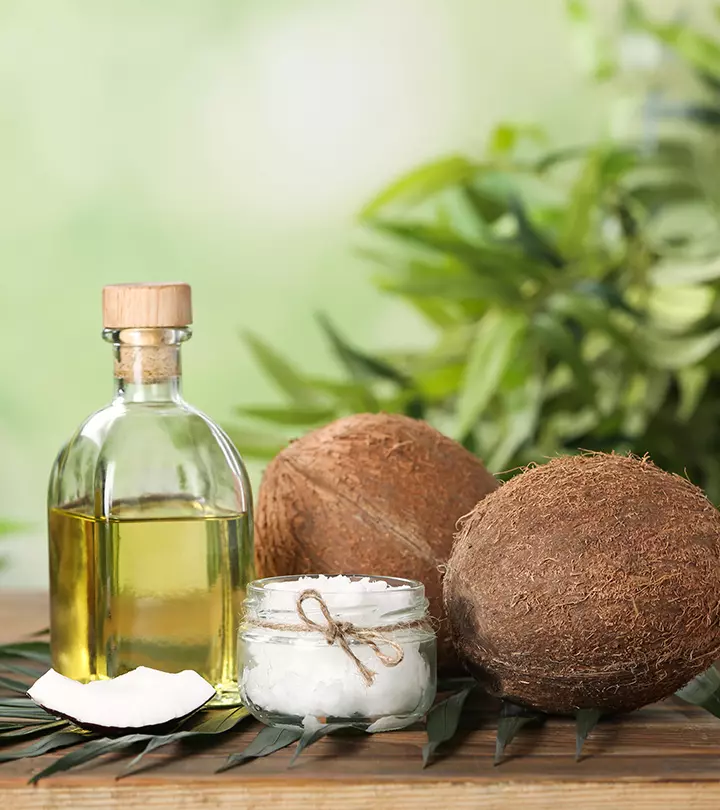
Image: Shutterstock
Coconut oil is a common home remedy for managing ringworm (tinea corporis), a fungal infection of the skin. It has both antimicrobial and antifungal properties and is effective against several strains of bacteria and fungi. In this article, we explain why coconut oil may help manage ringworm and how to use it as an alternative medicine. Keep reading to know more!
In This Article
What Is Ringworm And What Causes It?
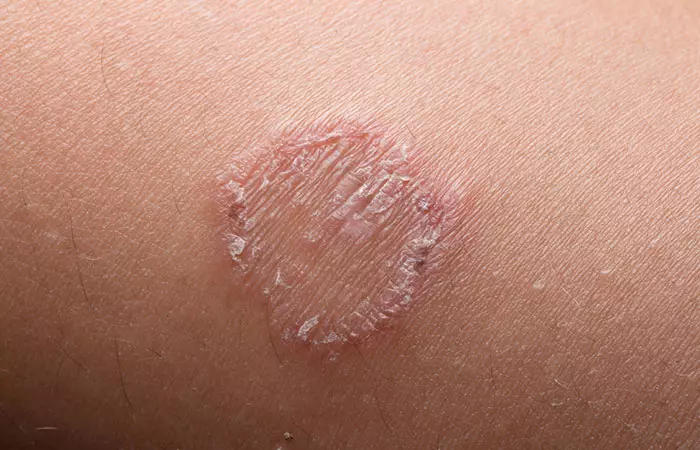
Ringworm (tinea corporis) is caused by the fungi Microsporum canis. This strain of fungi feeds on highly keratinized tissues, such as the hair, nails, and skin, destroys the epidermis, and causes inflammation.
Ringworm looks like a red, circular, flaky, and bumpy rash on the skin. It is highly contagious and may itch.
An American survey from 2022 shows a high-frequency of ringworm self-diagnosis. The survey had 4156 respondents, of which 114 (2.7%) reported having a ringworm infection and 415 (10%) had a fungal nail infection in the preceding 12 months. 36% of the respondents with ringworm infection were women. About 55% of the infected preferred over-the-counter treatments, while 18.3% opted for alternative or natural treatment.
 Quick Tip
Quick TipThis condition is commonly treated with oral and topical antifungal medications. However, many people use coconut oil as a home remedy for ringworm. Is it effective? Let’s find out.
Key Takeaways
- Ringworm (tinea corporis) is a fungal skin infection commonly treated with oral and topical medications.
- The antimicrobial and antifungal properties of coconut oil make it an effective home remedy for ringworm.
- To treat ringworm, you can combine coconut oil with essential oils that have antifungal effects, such as those made with tea tree, clove, and garlic.
- However, avoid using coconut oil if you are allergic to it, as it may cause hives, rashes, and blistering.
Is Coconut Oil An Effective Treatment For Ringworm?
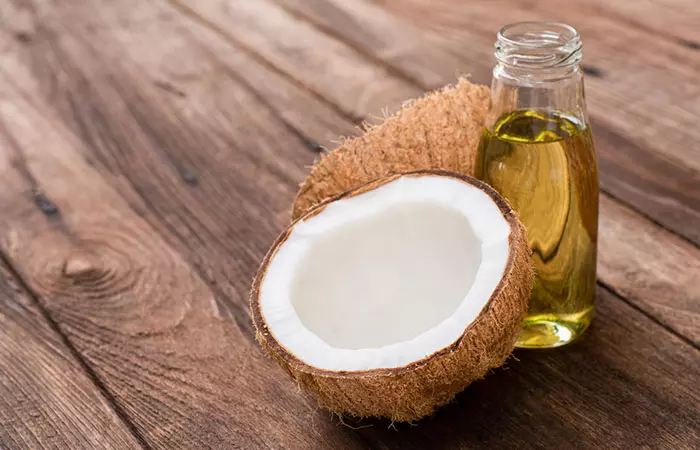
Here are the reasons coconut oil may work as a topical treatment for ringworm:
- Coconut shell oil has antimicrobial and antifungal properties, is effective against Microsporum canis, and may help reduce tinea corporis or ringworm (1), (2).
- Coconut oil promotes wound healing as it has anti-inflammatory and antioxidant properties (3). It soothes skin irritation and flakiness and may also help reduce the other symptoms and discomfort caused by ringworm.
Here are some ways you can use coconut oil to manage ringworm.
How To Use Coconut Oil For Ringworm
- Wash your hands and the affected area and pat them dry.
- Apply coconut oil to the affected area with a cotton swab or ball.
- Leave it overnight.
- Apply coconut oil 3-5 times a day.

You can combine coconut oil with essential oils with antifungal properties (4), (5), (6), (7). They include:

- Tea tree
- Peppermint
- Oregano
- Marjoram
- Clove
- Garlic
- Myrrh
- Helichrysum
- Lavender
- Geranium
- Mastic
- Terebinth
- Santolina
- Turmeric
 Quick Tip
Quick TipCoconut oil is a natural remedy that is safe for the skin. However, it may cause some side effects.
Side Effects Of Coconut Oil

Avoid coconut oil if you are allergic to it as it may cause:
- Hives
- Rashes
- Dryness
- Itching
- Blistering
It may even worsen the rash. Therefore, to prevent any adverse reactions, perform a patch test on the back of your hand or neck. If there is no inflammation or irritation, you can apply coconut oil to the affected area.
If you are allergic to coconut oil, you may try other antifungal remedies for ringworm. We have discussed them in the next section.
Natural Treatment Options For Ringworm
Here are some more home remedies for ringworm besides coconut oil that you may try:
- Tea Tree Oil
Apply diluted tea tree oil to the affected area. Its antifungal properties can help clear the infection (9).
- Aloe Vera
Aloe vera gel possesses antimicrobial properties (10). These may help soothe the irritation associated with ringworm. Apply it directly to the affected area.
- Garlic
Crush a garlic clove to make a paste and apply it to the ringworm. Garlic has natural antifungal properties that may help with the recovery (11).
- Apple Cider Vinegar
Dab a mixture of equal parts water and apple cider vinegar on the affected area. ACV possesses antifungal properties and may help treat the infection (12).
- Turmeric
Make a paste using turmeric powder and water and apply it to the ringworm. Turmeric has both antifungal and anti-inflammatory properties (13).
A blogger shared her personal experience about how she dealt with ringworm and the natural remedies she experimented with to treat the condition. She recounts in her blog post, “In June of 2009 our entire household (two adults, four children, four cats and one dog) got ringworm from a kitten we had brought home for our oldest daughter’s 8th birthday (i).” She then proceeds to talk about the simple recipes she tried to combat the issue and shares, “Finally I got out all of our herbal and essential oil books, composed a list of some anti-fungal ingredients that we already had on hand and went wildcrafting for the one plant I really wanted to include- usnea.”
While the remedies may be effective in varying degrees, the best course is to prevent ringworm in the first place. Preventing ringworm is all about good hygiene and simple habits that reduce the risk of spreading or catching the infection. By staying consistent with these measures, you can protect yourself and others from this contagious condition.
Preventive Measures
Here are some simple tips:
- Wash your hands regularly with soap and water, especially after touching animals or contaminated surfaces.
- Avoid sharing personal items like towels, clothes, or hairbrushes to prevent the spread of the infection.
- Keep your skin clean and dry, particularly in areas prone to sweating, as ringworm thrives in moist environments.
- Wear breathable clothing to reduce moisture buildup on your skin.
- Change and wash your clothes, socks, and underwear daily to minimize contamination risks.
- Disinfect commonly touched surfaces, like gym equipment or shared furniture, regularly.
- If you have pets, check them for signs of ringworm and take them to the vet for treatment if necessary.
- Avoid walking barefoot in communal areas like swimming pools or locker rooms to reduce exposure.
Infographic: Coconut Oil For Ringworms And Its Side Effects
Coconut oil is known for managing severe fungal infections, including ringworm. It has antifungal properties that help heal and treat ringworms and lighten the marks as well. Below is an infographic on how to use coconut oil to manage ringworm and also some possible side effects to look out for. Scroll down to know more!

Illustration: StyleCraze Design Team
The antimicrobial and antifungal properties of coconut oil make it one of the effective ways to treat ringworm. You can use coconut oil for ringworm infection as it is effective against several strains of bacteria and fungi. It also helps soothe the skin and reduce the discomfort caused by ringworm. You may directly apply the coconut oil to the affected area or combine it with other essential oils like tea tree oil or lavender oil. However, always perform a patch test before using it, as some people are allergic to coconut oil.
Frequently Asked Questions
How long does it take for a ringworm to heal with coconut oil?
With regular application, you may see improvement in a few weeks. However, complete healing could take up to months, depending on the severity.
What cures ringworm fast?
Ringworm can be treated with over-the-counter antifungals. They destroy the fungus quickly and facilitate healing. In addition, aloe vera is the most effective home remedy for ringworm. (1)
Why do I keep getting ringworms?
There are numerous reasons why a person gets ringworms on their body. For example, a person is more likely to show symptoms if they live in a warm climate, have close contact with an infected person or animal, and so on.
Can I put Vaseline on ringworm?
No, an OTC antifungal medicine is the first line of defense for most ringworm cases that affect the skin. On the other hand, more severe infections may require prescription topical or oral medications.
How do you stop ringworm from spreading?
To stop ringworm from spreading,
- Don’t touch or scratch the lesion.
- Wash your hands thoroughly after handling the lesion.
- Wash clothes, blankets, and towels in soap and warm water
- Do not share personal items.
- Avoid walking barefoot at home.
- Try home remedies like coconut oil and hydrogen peroxide for ringworms to control the spread.
- Seek veterinarian treatment if your pet has ringworm.
Illustration: Coconut Oil For Ringworm: How To Use It
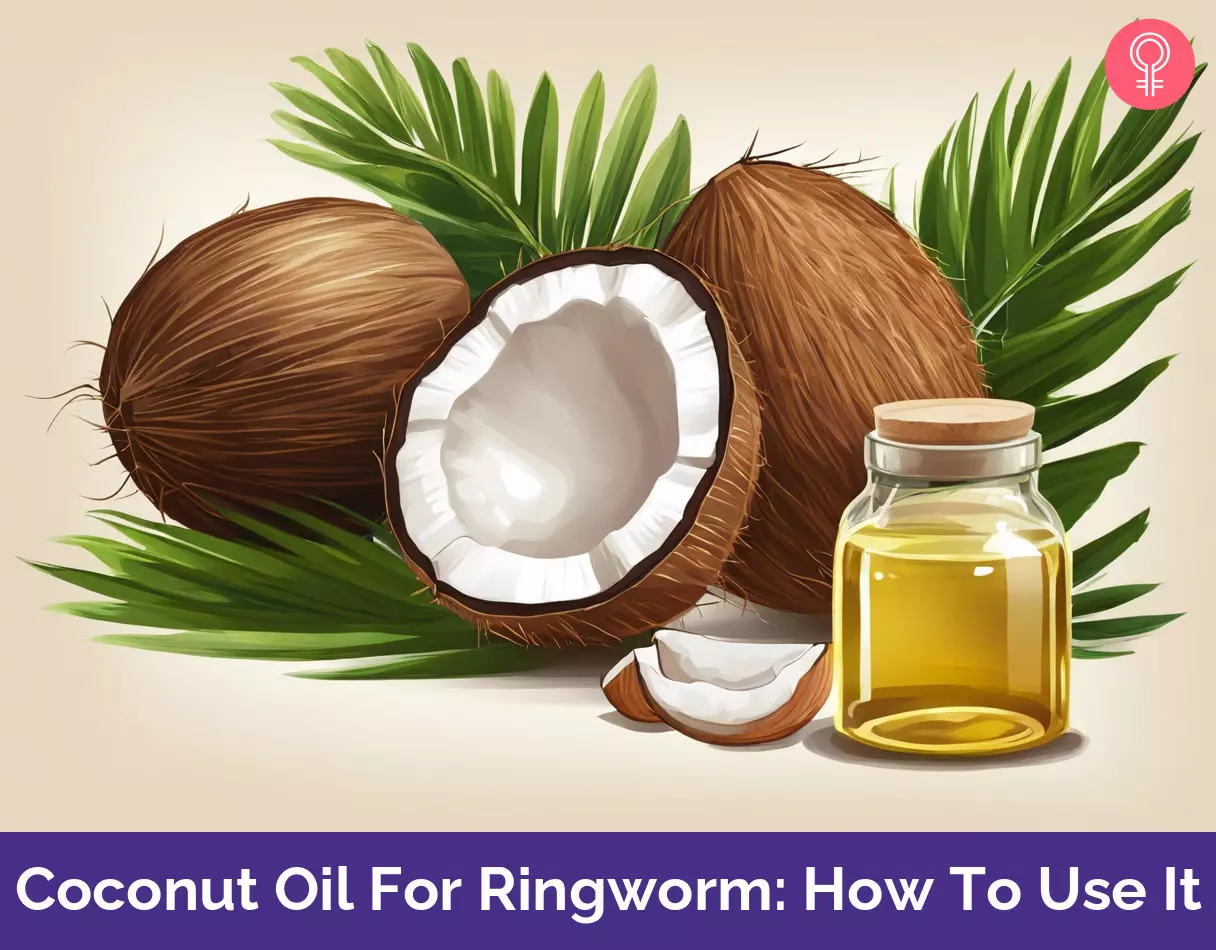
Image: Stable Diffusion/StyleCraze Design Team
Satisfy your curiosity about coconut oil’s potential in treating ringworm. Check out the video below and explore the truth behind its effectiveness and learn whether it can indeed cure ringworm or not!
Personal Experience: Source
StyleCraze's articles are interwoven with authentic personal narratives that provide depth and resonance to our content. Below are the sources of the personal accounts referenced in this article.
i. Ringworm– There is Hope Without Exhaustionhttps://oneofhissheep.wordpress.com/2011/02/07/ringworm-there-is-hope-without-exhaustion/
References
Articles on StyleCraze are backed by verified information from peer-reviewed and academic research papers, reputed organizations, research institutions, and medical associations to ensure accuracy and relevance. Read our editorial policy to learn more.
- Control of Tinea (Ringworm) using Aloe vera Gel in River State
https://www.researchgate.net/publication/280078596_Control_of_Tinea_Ringworm_using_Aloe_vera_Gel_in_River_State - Antifungal Potential and Antioxidant Efficacy in the Shell Extract of Cocos Nucifera (l.) (arecaceae) Against Pathogenic Dermal Mycosis
https://www.ncbi.nlm.nih.gov/pmc/articles/PMC5456225/ - Effect of Topical Application of Virgin Coconut Oil on Skin Components and Antioxidant Status During Dermal Wound Healing in Young Rats
https://pubmed.ncbi.nlm.nih.gov/20523108/ - Commercial Essential Oils as Potential Antimicrobials to Treat Skin Diseases
https://www.ncbi.nlm.nih.gov/pmc/articles/PMC5435909/ - Efficacy of Origanum Essential Oils for Inhibition of Potentially Pathogenic Fungi
https://www.scielo.br/j/bjps/a/PXrN3YrZwGwHTbtsWBTXj9j/?format=pdf&lang=en - Antifungal Activity of Clove Oil on Dermatophytes and Other Fungi
https://www.researchgate.net/publication/328049156_Antifungal_Activity_of_Clove_Oil_On_Dermatophytes_and_Other_Fungi - Antidermatophytic Properties of Ar-Turmerone, Turmeric Oil, and Curcuma Longa Preparations
https://www.ncbi.nlm.nih.gov/pmc/articles/PMC3770062/ - Tinea Corporis
https://www.ncbi.nlm.nih.gov/books/NBK544360/ - Antifungal activity of tea tree oil from Melaleuca alternifolia against Trichophyton equinum: an in vivo assay
https://pubmed.ncbi.nlm.nih.gov/19403294/ - Evaluation of antimicrobial efficacy of Aloe vera and its effectiveness in decontaminating gutta percha cones
https://www.ncbi.nlm.nih.gov/pmc/articles/PMC3410334/ - Fungal infection control by garlic extracts (Allium sativum L.) and modulation of peritoneal macrophages activity in murine model of sporotrichosis
https://pubmed.ncbi.nlm.nih.gov/28492800/ - Antifungal and antibacterial activities of apple vinegar of different cultivars
https://www.ncbi.nlm.nih.gov/pmc/articles/PMC8369171/ - A review on antibacterial antiviral and antifungal activity of curcumin
https://www.ncbi.nlm.nih.gov/pmc/articles/PMC4022204/
Read full bio of Dr. Priya Gill
Read full bio of Anjali Sayee
Read full bio of Ramona Sinha
Read full bio of Shiboli Chakraborti









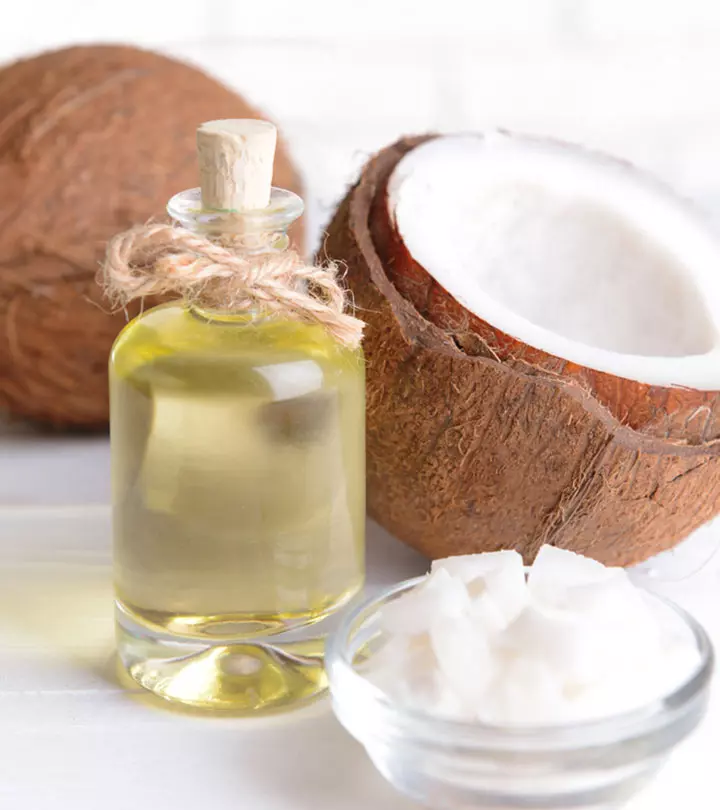
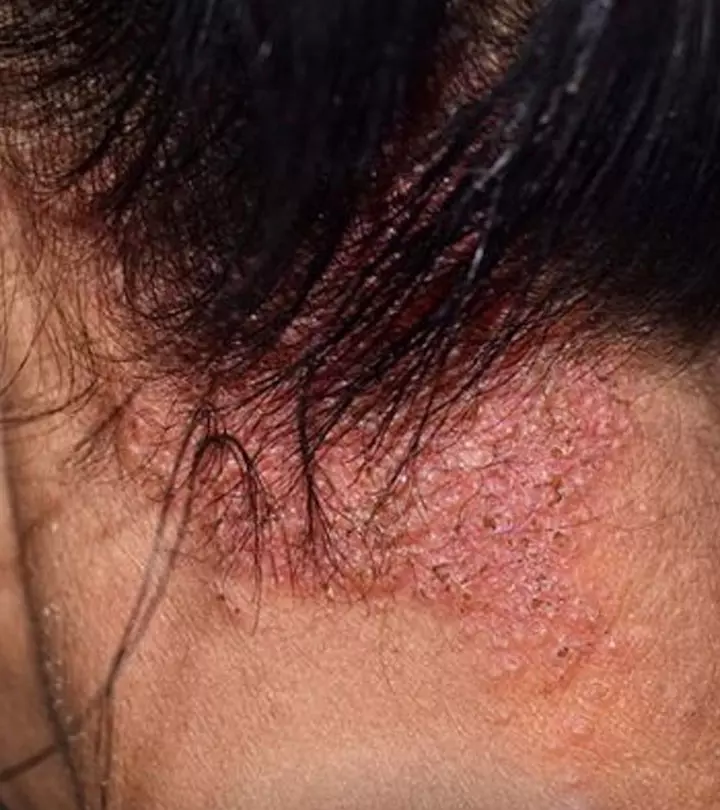


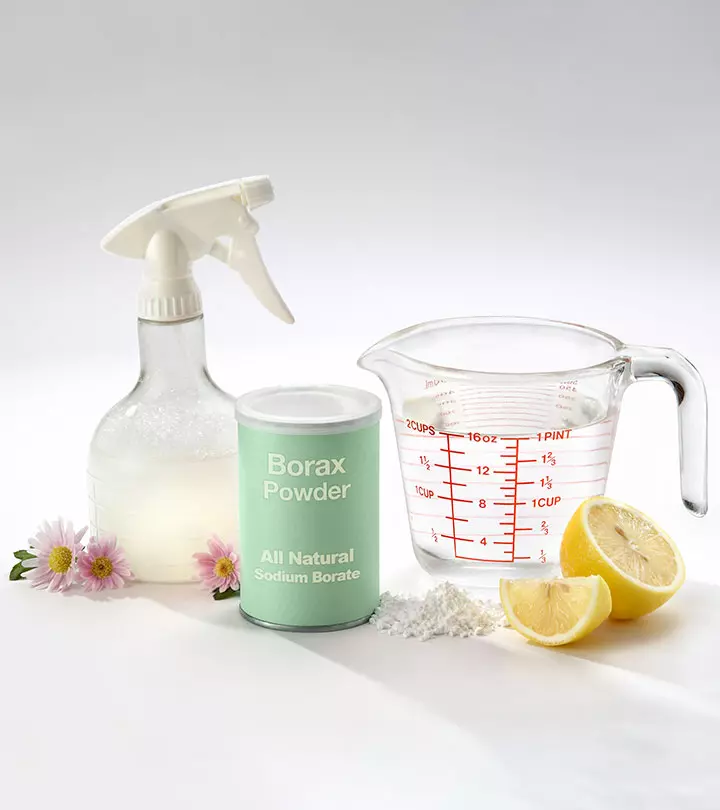





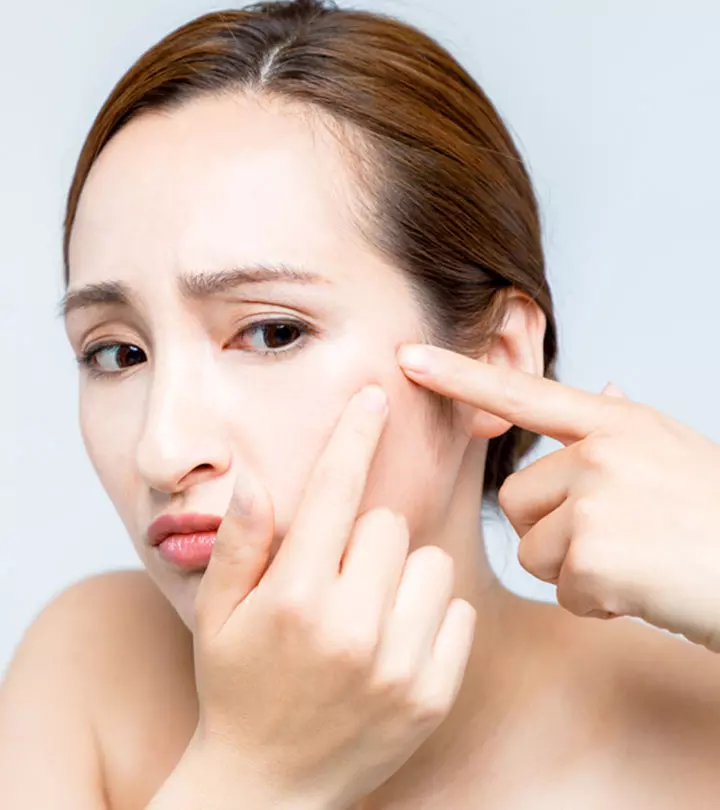






Community Experiences
Join the conversation and become a part of our empowering community! Share your stories, experiences, and insights to connect with other beauty, lifestyle, and health enthusiasts.